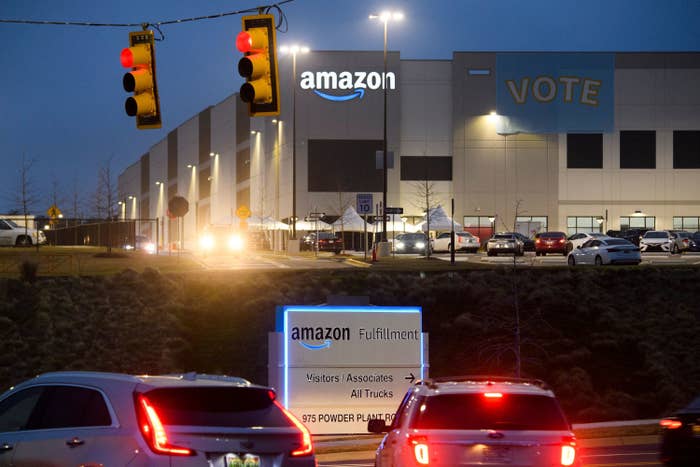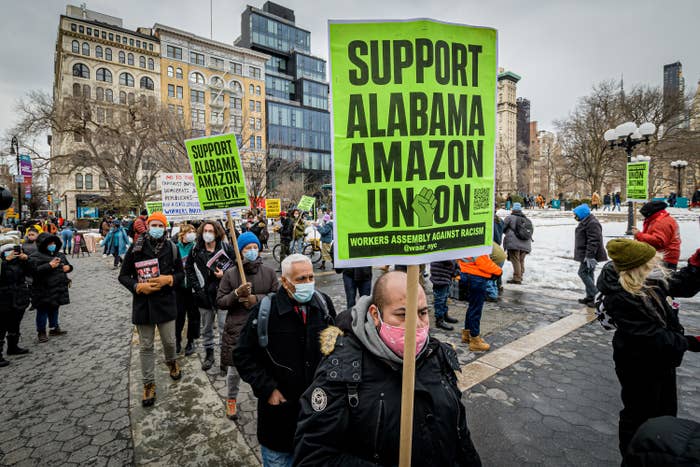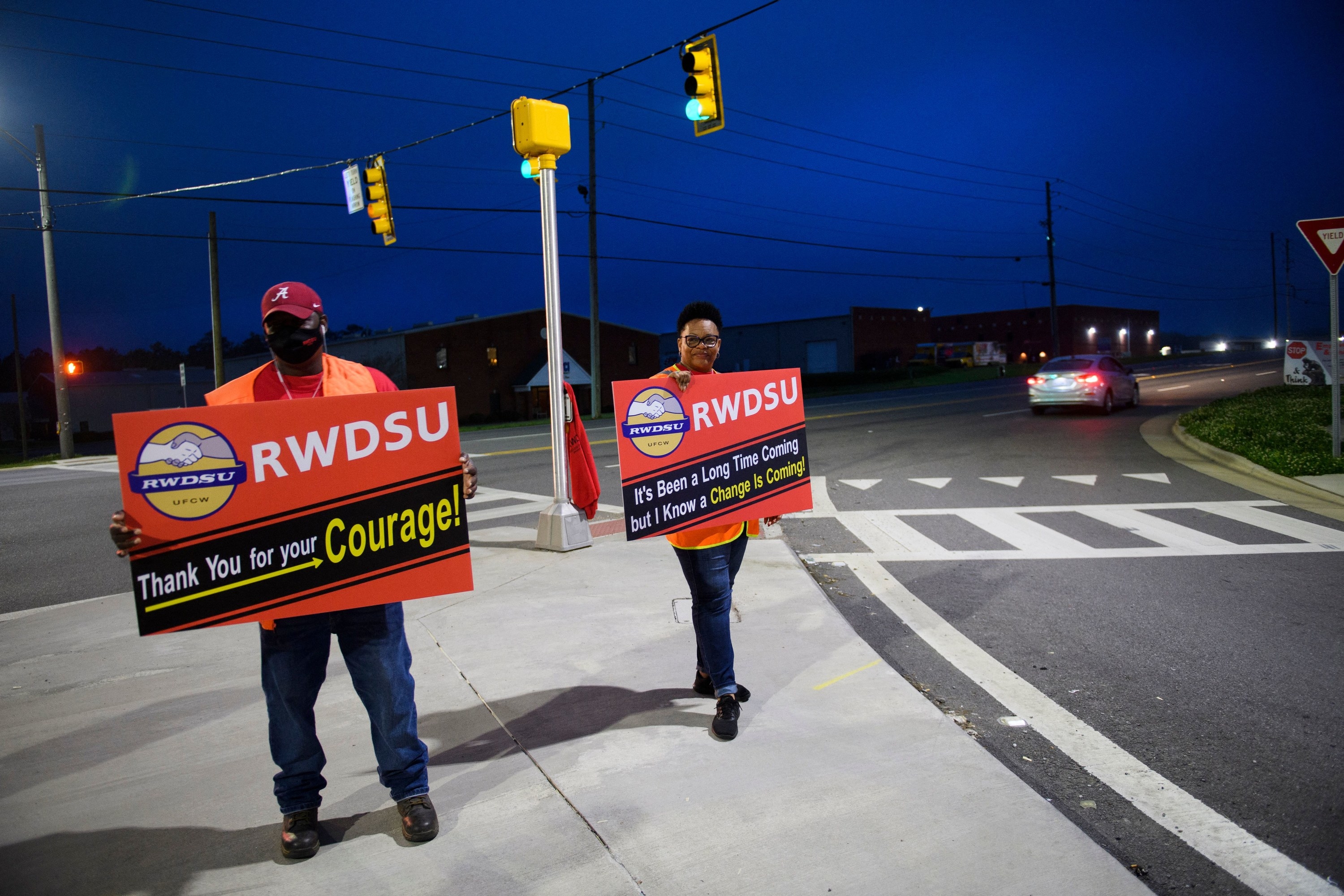
When Kylee Rancour relocated from Massachusetts to Bessemer, Alabama, and took a job at Amazon, she was shocked to learn that her hourly wage would increase, even though Alabama’s minimum wage is only $7.25 compared to Massachusetts’s $14.25. Her health insurance package also offered more coverage.
“I still make $3 more an hour than I did before," she told BuzzFeed News. "If it weren't for Amazon's pay and benefits, we would be struggling to afford a place to live.”
The pay and benefits are the reason Rancour said she voted against unionizing in the ongoing election at the warehouse where she works. She and other workers have been mailing in their ballots since February as the Retail, Wholesale and Department Store Union tries again to win a union following its initial loss in 2021.
The results of that election were thrown out after the National Labor Relations Board determined that Amazon had illegally interfered with the process. Now, the union is alleging more of the same. Earlier this month, workers filed a charge with the NLRB accusing Amazon of, among other things, requiring workers to attend meetings “where employees were told to specifically vote ‘no’ for the union, and threatened that if a union got them higher wages, it would take away from their benefits.” Amazon said it has “fully complied with the law,” under which it is illegal to threaten employees with "loss of benefits" or other "adverse consequences.”
Pro-union workers who spoke with BuzzFeed News said they have to work to convince their colleagues that a union victory will help, not harm, them.
“They’re afraid of losing pay, afraid of losing benefits, or their job,” said Amazon employee and union organizer Jennifer Bates. “Those are the tactics Amazon is using. They want to confuse the employees. We often tell them, we have to go through negotiations, what they have is protected. We go to the table with Amazon … We’re the union, and we have the final say on the contract.”
But organizers' efforts continue to run up against Amazon’s message that union negotiations could leave workers worse off.
Some Amazon workers who oppose the union, eight of whom spoke with BuzzFeed News, said they are concerned their current job conditions would be at risk even if the union wins.
“I'm very worried about what would happen should the union be voted in. It could mean sacrificing benefits in exchange for things we don't want or need,” Rancour said. “As Amazon currently stands, employee raises [and] overtime are excellent, and I would hate to jeopardize what has definitely been the most reliable and financially stabilizing job I've had.”
Pro-union sentiment in the United States is at its highest point since 1965, according to a 2021 Gallup survey. In Jefferson County, Alabama, where Bessemer is located, the majority of residents support Amazon workers unionizing, according to a survey by the Institute for Policy Studies, a progressive think-tank. But despite high-profile union victories like the organizing wave at Starbucks, overall union membership in the United States is still on the decline, according to the Bureau for Labor Statistics.
The question of whether to unionize is being debated at workplaces like Amazon’s Bessemer warehouse, where employees in precarious financial situations are often left divided on the best path forward.

In a statement, Amazon spokesperson Barbara Agrait said, “It’s our employees’ choice whether or not to join a union. It always has been.”
But RWDSU president Stuart Applebaum said the disparity between public support and union membership stems from the weak state of labor laws in the United States. “Workers have said over and over and over again that, if they had a choice, they would want a union in their workplace,” he told BuzzFeed News. “If it were not for the intimidation and interference, more people would be union members today.”
Tensions have been rising inside the Bessemer Amazon warehouse as the deadline for ballots, March 25, draws closer. Employees said they’ve seen verbal altercations between pro- and anti-union workers at Amazon’s mandatory meetings; two people told BuzzFeed News they were aware of a physical fight that took place near the main entrance to the warehouse where worker organizers pass out T-shirts.
In messages to workers, Amazon has accused the union of overly aggressive tactics. “We wanted to let you know that we received reports regarding activity that occurred in front of the building tonight,” a mass text message sent to workers in February read. “Some of you told us that the organizers yelled at you and made offensive comments if you refused to accept their T-shirts and made you feel unsafe. We are sorry that RWDSU has subjected you to this behavior on your way to work. Ask yourself whether these are the type of people you want representing you. Show the union you don't want this…Vote No!”
Terri Addington, an Amazon worker who voted against unionizing, agreed with the company’s criticism. “The union has called over 40 times. I've talked to them once [on] the phone and once in person at my house,” she said. “They don't know when to stop.”
Employee and organizer Perry Connelly said he saw it differently: of all the doors he’s knocked on, no worker has ever asked him to leave. If anything, he said, the workers who oppose the union tend to be more aggressive. “I was out there when all this happened,” he said, referring to Amazon’s text message. “It was the people that was coming in that was yelling at us. They started chanting, ‘Vote no! Vote no! Vote no!’.”
Applebaum, the union president, said fanning the flames at work is part of Amazon’s playbook. “They want to make us look like bullies to hide the fact that they’re doing everything they can to prevent workers from having a collective voice,” he said.
Amazon said it investigates all allegations of conflicts at the warehouse. “No employee should feel threatened when coming to work,” Agrait said.
Shannon Villa, another Amazon employee, said he respects what the union organizers are trying to do but still plans to vote no. When Villa moved to the new Amazon facility in Bessemer from a management-track job at Walmart two years ago, his pay shot up to $18.30 an hour, or about “four dollars more than what [he] made at Walmart,” he said. He worries that if workers vote to bring in the union, it could put the benefits Amazon offers, like short-term disability insurance, at risk. “I don’t want to give up those free little things I didn’t have at Walmart,” he said.
One of the benefits Villa especially enjoys is life insurance. When his mom was diagnosed with terminal cancer a few years ago, she made sure Villa had the funds to cover her funeral expenses before she died. “She set me up to where I wouldn’t be in debt, and I was grateful for it,” he said. Villa said he hopes Amazon’s insurance policy will provide the same peace of mind to his wife and three kids should anything happen to him.
“If I die, they’ll get $10,000, and that’s enough to cover my funeral costs,” he said. “I know my family would be okay if something happened to me. It’s one less thing they have to worry about. I’m setting up a future for them.”
Employers aren’t legally allowed to threaten existing benefits or wages during a union election, and if the union won, workers’ compensation would remain unchanged until a collective bargaining contract was approved. But some Amazon employees remain convinced that a union victory could lead to worsening job conditions. Others are concerned about the cost of union dues, $9.25 per week, even though Alabama law doesn’t require union workers to pay dues if they don’t want to.
OV Garner II earned $12.50 an hour at his last job but makes $16.65 an hour if he works the night shift at Amazon. Garner recently became eligible for a promotion, which he said he expects to receive the next time a position opens. One of the reasons he’s voting against the union is because he believes “it's well known that unions promote based off of seniority.”
“Amazon has great benefits, the pay is good, and I like the opportunity to be able to get promoted based off of my work,” he said.

Connelly, one of the union organizers, said the problem is that his coworkers who oppose the union “believe Amazon when Amazon said that they would lose money and lose benefits.”
“The fact is that we’d have the opportunity to read [the contract], see what we’re getting compared to what we had, and make a decision on whether we want to accept the contract or send it back for re-negotiation,” Connelly said. “Nobody is going to accept a contract making less money.”
In messages to workers, Amazon has highlighted the potential costs of those negotiations: In February, the company sent a text to Bessemer staff warning that strikes “can potentially have a negative impact on workers.”
“For example, in Tuscaloosa, union represented employees at Warrior Met Coal have been on strike for almost 11 months without their normal pay,” said the text message, which was seen by BuzzFeed News.
That message resonated with employee Donald Knapp, who said he's voting against the union because he appreciates the insurance, vacation time, unlimited overtime, and tuition payments the company offers, but also because of what could happen in the event of a work stoppage. “Look at the coal mines,” he said, “been on strike for almost two years, and the union won't pay them. They had to get new jobs.”
Striking coal workers may not be receiving wages, but they are receiving pay from the union’s strike fund — $800 every two weeks, according to Haeden Wright, auxiliary president for United Mine Workers Locals 2245 and 2368. Workers also receive medical insurance from the union. "If we were on strike another [two] years, the strike fund still wouldn't be close to running out," Wright told BuzzFeed News.
Applebaum, the union president, said that, as with a contract, workers would have to vote to approve a strike. ”If the workers choose to go on strike, the union has strike funds they would make available to them, but we’re not anticipating a strike,” he said.
As Amazon has disseminated its message to workers through texts, calls, and mandatory meetings, RWDSU has continued to use the NLRB process to curtail those efforts. Currently, employers are allowed to require workers to attend meetings where the company shares its perspective on how unions work. Amazon described them as “ regular informational sessions” that “provide employees the opportunity to ask questions and learn about what this could mean for them and their day-to-day life working at Amazon.”
But unions are starting to challenge what they call “captive audience” meetings. In legal filings and interviews, the union has asked the board’s Biden-appointed general counsel, Jennifer Abruzzo, to review the practice, which RWDSU lawyers called “coercive” in an unfair labor practice charge filed against Amazon in February.
“We are calling on the NLRB to say that captive audience meetings violate the law and should no longer be tolerated,” said Applebaum.
The organizing campaign in Bessemer could stretch on for a long time; a hotly contested campaign at a Smithfield Foods plant in North Carolina took three reruns and 16 years before the union won in 2008. In the meantime, some workers see little room for optimism no matter the outcome.
After observing Amazon's “behavior and tactics” throughout the election, employee Christine Barnes said she no longer trusts the company, which she said has put more resources into fighting the union than “into meeting their employees' needs.” But at the same time, she said, she doesn’t want the union interfering with issues at work.
“I don’t care for or trust Amazon or this particular union,” she said. “Either way this election goes, we’re going to be screwed.”
